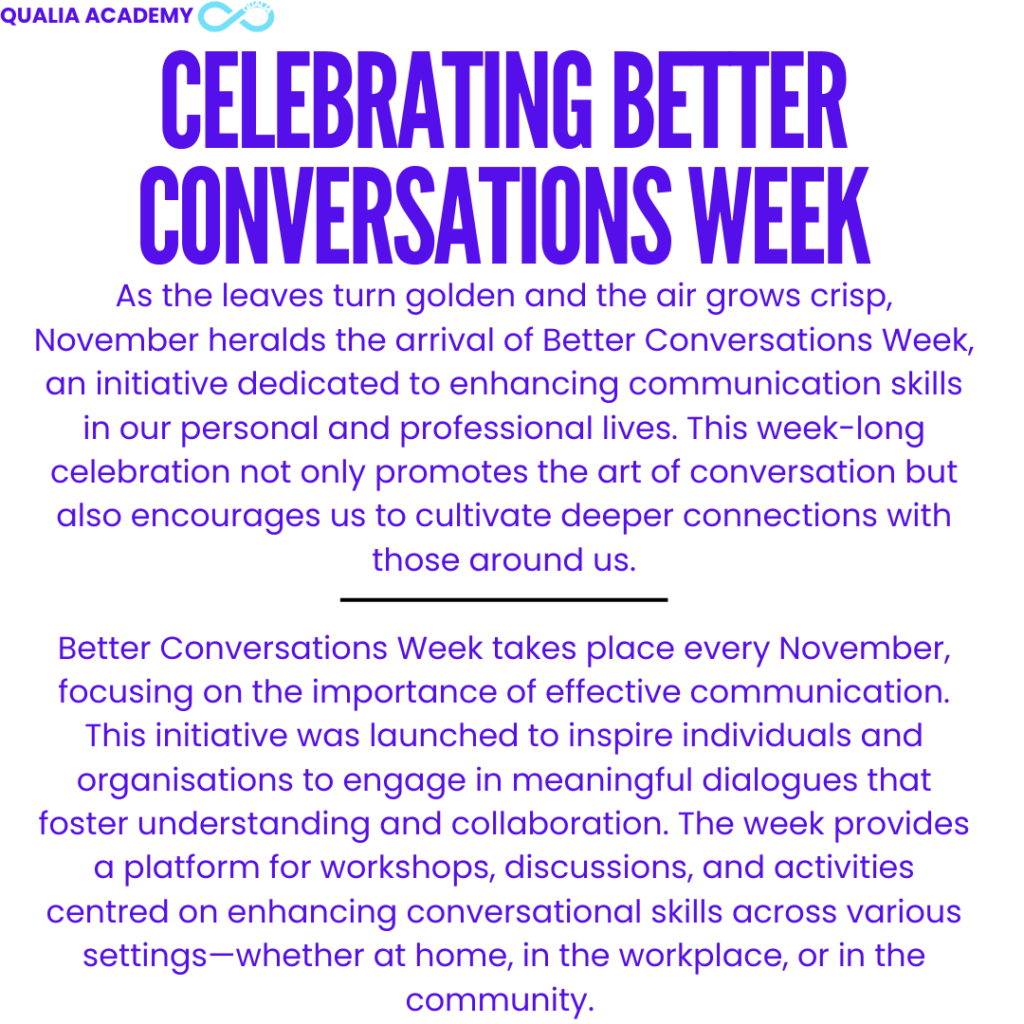
As the leaves turn golden and the air grows crisp, November heralds the arrival of Better Conversations Week, an initiative dedicated to enhancing communication skills in our personal and professional lives. This week 25th – 30th, -long celebration not only promotes the art of conversation but also encourages us to cultivate deeper connections with those around us. In this blog post, we’ll delve into the significance of Better Conversations Week, explore its objectives, and offer practical tips to improve your conversational skills.
What is Better Conversations Week?
Better Conversations Week takes place every November, focusing on the importance of effective communication. This initiative was launched to inspire individuals and organisations to engage in meaningful dialogues that foster understanding and collaboration. The week provides a platform for workshops, discussions, and activities centred on enhancing conversational skills across various settings—whether at home, in the workplace, or in the community.
At its core, Better Conversations Week aims to highlight the following key objectives:
Promoting Active Listening:
One of the cornerstones of effective communication is the ability to listen actively. This week encourages participants to focus on truly hearing what others are saying, rather than merely waiting for their turn to speak.
Encouraging Empathy:
Better conversations foster empathy, helping individuals to understand different perspectives and emotions. By embracing empathy, we can build stronger relationships and create a more inclusive environment.
Building Confidence:
Many people struggle with communication due to a lack of confidence. Better Conversations Week seeks to empower individuals by providing them with the tools and techniques necessary to engage in conversations comfortably and effectively.
Fostering Inclusivity:
Communication is an essential aspect of inclusivity. This week promotes conversations that respect and celebrate diversity, encouraging people to share their thoughts and experiences openly.
Creating Safe Spaces:
In order for conversations to thrive, individuals must feel safe and supported. Better Conversations Week emphasises the importance of creating environments where everyone feels valued and heard.
The Benefits of Having Better Conversations
Improving our conversational skills can have a profound impact on various aspects of our lives. Here are some key benefits of engaging in better conversations:
Strengthened Relationships
Effective communication is the bedrock of any strong relationship, whether personal or professional. By engaging in meaningful conversations, we can build trust, deepen our connections, and foster a sense of belonging. When we listen actively and respond empathetically, we create an environment where others feel comfortable sharing their thoughts and feelings.
Enhanced Problem Solving
Better conversations can lead to more effective problem-solving. When individuals feel comfortable expressing their ideas and concerns, teams can collaborate more effectively to find innovative solutions. Open dialogue encourages diverse perspectives, allowing for a broader range of ideas and strategies to emerge.
Increased Productivity
In the workplace, clear and effective communication can significantly enhance productivity. When team members communicate openly, misunderstandings can be minimised, and tasks can be completed more efficiently. Better conversations lead to clearer expectations and a more collaborative work environment.
Personal Growth
Engaging in better conversations can also foster personal growth. When we challenge our own perspectives and actively seek to understand others, we expand our horizons and develop greater empathy. This growth not only enhances our relationships but also enriches our lives as a whole.
Conflict Resolution
Conflicts are an inevitable part of any relationship, but effective communication can help resolve them constructively. By engaging in open and honest conversations, individuals can address issues directly, express their feelings, and work together to find mutually beneficial solutions.
Tips for Improving Communication Skills
To make the most of Better Conversations Week, consider implementing the following tips into your daily interactions:
Practice Active Listening
Active listening is essential for meaningful conversations. Focus on the speaker, maintain eye contact, and avoid distractions. Repeat back what you’ve heard to ensure understanding and encourage the speaker to elaborate on their thoughts.
Ask Open-Ended Questions
Encourage deeper conversations by asking open-ended questions. Instead of simple “yes” or “no” questions, opt for queries that require thoughtful responses, such as “What do you think about…?” or “How did that make you feel?”
Show Empathy
Empathy is crucial for fostering understanding. Acknowledge the speaker’s feelings and experiences, and respond in a way that shows you genuinely care. Simple phrases like “I can see why you feel that way” can go a long way in building rapport.
Be Mindful of Non-Verbal Communication
Non-verbal cues, such as body language and facial expressions, play a significant role in communication. Be aware of your own non-verbal signals and pay attention to those of others. Ensure your body language conveys openness and attentiveness.
Create a Comfortable Environment
Whether in a personal or professional setting, strive to create a space conducive to conversation. This includes minimising distractions, ensuring privacy, and promoting a relaxed atmosphere where everyone feels safe to share their thoughts.
Be Open to Feedback
Encourage feedback on your communication style and be open to making adjustments. Constructive criticism can help you grow and develop better conversational skills over time.
Reflect on Conversations
After engaging in a conversation, take a moment to reflect on what went well and what could be improved. This self-assessment can help you identify areas for growth and reinforce positive communication habits.
Moving Forward
Better Conversations Week serves as a valuable reminder of the importance of effective communication in our lives. By actively participating in this initiative, we can enhance our conversational skills, build stronger relationships, and create a more inclusive and empathetic society.
As November approaches, let us embrace the opportunity to engage in better conversations, fostering understanding and connection with those around us. Whether in our personal lives or professional environments, the power of conversation can transform our interactions and enrich our experiences. So, this November, let’s make a conscious effort to listen, understand, and connect—one conversation at a time.









